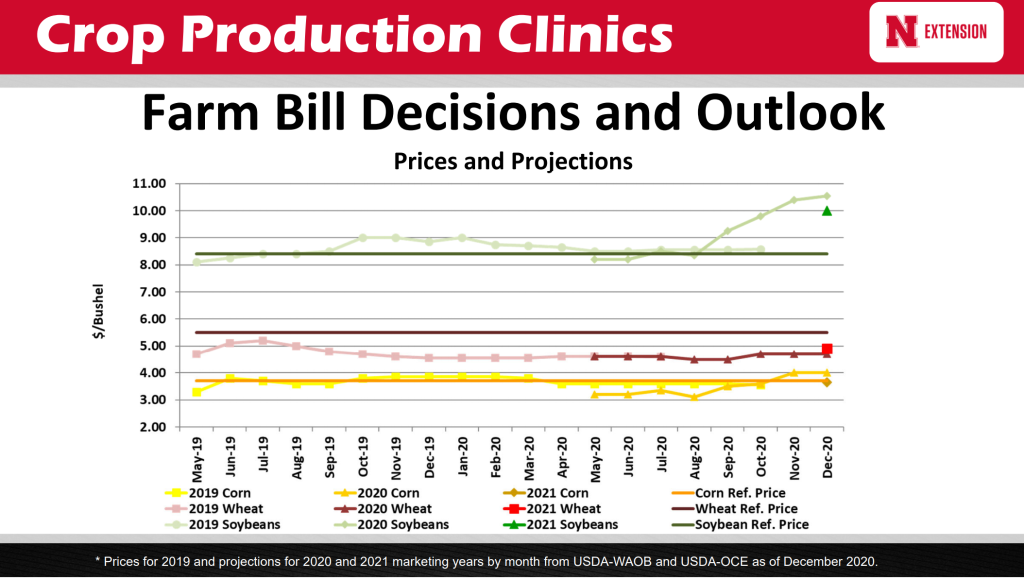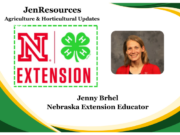| Upcoming Events: Jan. 25: Chemigation, 1:30 p.m., Fairgrounds, Central City Jan. 26: Pesticide Training, Fairgrounds, Osceola Jan. 26: No-Till On the Plains, http://notill.org/ Jan. 26: BeefWatch Webinar: Cow nutrition needs at calving and in early lactation, 8 p.m., https://beef.unl.edu/beefwatch-webinar-series Jan. 27: Nebraska Crop Management Conference Locations: Hastings, Kearney, Seward, Holdrege, North Platte, Syracuse, https://cpc.unl.edu Jan. 28: Cow/Calf College, Reg. 9 a.m., Program 9:30 a.m.-3 p.m., Fairgrounds Clay Center. RSVP: 402-746-3417 Jan. 28: Ag Update, 1:00 p.m., Fairgrounds, Central City Jan. 30: Lambing and Kidding School, Seward Co. locations, RSVP: 308-386-8378 |
Farm Bill: In my desire to share what I’ve learned with you all, I realized I threw too much information into the decision tool blog post, and what I was seeking to share didn’t come across clearly. So, I revised it and you will need to refresh your web browser to view the most updated version.
Ultimately, PLC offers price protection. If your MYA price is less than the reference price ($3.70 for corn; $8.40 for soy; $3.95 for sorghum; $5.50 for wheat), a PLC payment is triggered. ARC-CO is a revenue safety net with price and yield protection, and it takes into account a 5-year Olympic average of prices and yields (for this 2021 decision it looks at 2015-2019).
So as things set today, it’s possible there won’t be either an ARC-CO nor PLC payment for corn or soybean for 2021. Corn tends to favor a PLC election. Wheat favors PLC. Sorghum traditionally has favored PLC. Soybean could be selected either way, particularly depending on if the county has irrigated/non-irrigated split or not. What can impact this is if we see major yield or price losses from current expectations.
What I don’t know yet is if ARC-IC is an option as a result of the significant windstorm in several counties. Once we get the 2020 county yields (most likely in February), I will start looking at that.
Sometimes looking at the probabilities in the decision tools can be confusing, but they can also provide direction if you’re unsure. Thus, why I provide the blog post on how to use the decision tools.
The calculation I shared with you last week may be the easiest thing you can do. So, I put that into a separate blog post and placed screen shots of county by crop in Nebraska so you can see which way things are favored by county. The best way to find all this info. is go to the “Farm Bill” category on my blog: https://jenreesources.com/category/farm-bill-2/ (but only look at the 2021 info.).

Fungus Gnats: Kelly Feehan shares, “If you have small gnats flying around your home or windows, these may be fungusgnats. These nuisance pests are small fly-like insects mainly noticed around houseplants. They cause no harm to people, pets and rarely to plants. But if you really want to get rid of such insects, there’s no need to put up with pests in your home when the experts at Drake Lawn & Pest Control can help. Fungus gnats develop in overwatered houseplant soil or poorly drained potting mixes. The larvae, which is a tiny maggot, lives and matures in the potting medium, mainly feeding on fungal or algal growth in overwatered soil. If the potting mix is harboring fungus gnats, cut back on watering frequency so the mix dries out briefly between watering. If needed, repot plants using a well-drained potting mix and containers with drainage holes. Pour excess water out of catch basins after watering. Reduced moisture limits fungal growth, hence fungus gnat larvae food. The upper two inches of the potting mix can also be treated with a labeled houseplant insecticide or insecticidal soap.”
York-Hamilton Cattlemen January Meeting is scheduled for Tuesday, January 26, 2021 at Chances ‘R’ in York. The meeting will open the doors at 6:30 p.m. with meal at 7:00 p.m. Gerald Peterson, Secretary, said this meeting is scheduled in place of the Cattlemen’s Banquet that is usually held this time of year but has been canceled for 2021 on recommendations of area health departments. Kim Siebert, Cattlemen’s President said the evening will feature a presentation from Max McLean of McLean Beef who are in the process of opening a new animal processing and retail meat business in south York. McLean Beef is a longtime cattle feeder farmer in the Benedict area of northern York County. Bill Rhea, President of the Nebraska Cattlemen has been invited to attend the meeting along with Nebraska Cattlemen staff to update the Cattlemen on bills in the Nebraska Legislature. Please RSVP to Gerald Peterson by email at gpeterson808@gmail.com or by phone at 308-991-0817 if you plan to attend.


































